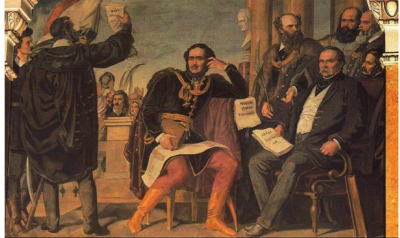
© https://hungarytoday.hu
Цього літа в Угорщині відзначили важливу культурну подію — вихід шостого, завершального тому Повного видання поезій Шандора Петефі. Цей масштабний проєкт, що тривав понад п’ять десятиліть, став ключовим досягненням угорської літературознавчої науки. Том, присвячений поезії періоду 1848–1849 років — часу Угорської революції та визвольної боротьби — було підготовлено за підтримки Культурного агентства Петефі й видано спільно Національною бібліотекою ім. Сечені та видавництвом Universitas. Як зазначено у прес-релізі, видання не лише завершує редакторську роботу, розпочату ще 1973 року, а й відкриває нові можливості для інтерпретації постаті поета та його мови. Проєкт тривав 52 роки — удвічі довше, ніж прожив сам Петефі, який, найімовірніше, загинув у битві під Шегешваром (повіт Муреш, Румунія) у 1849 році. Його творчість, тісно пов’язана з революційним піднесенням угорського народу, постала у цьому виданні в повному обсязі. Останній том включає не лише знакові вірші про революційні події, а й Апостола (Az apostol) — останній великий епічний твір Петефі, який поєднує політичне бачення та поетичну форму. Як наголошують упорядники, критичне видання реконструює оригінальний текст, відтворює обставини його створення, аналізує культурні коди та додає коментарі щодо сприйняття віршів у контексті їхнього часу. Видання також стало вшануванням 200-річчя від дня народження Петефі, якого вважають символом національної ідентичності Угорщини. Презентація книги відбулася в Національній бібліотеці іноземної літератури в Будапешті, а сам том уже доступний для читачів. У прес-релізі також згадується про вагомий внесок Ференца Кереньї — провідного дослідника творчості Петефі, який до своєї смерті у 2008 році підготував значну частину останніх томів. Завершив редакторську роботу Мартон Сіладі, який присвятив понад півтора десятиліття філігранному аналізу текстів, забезпечивши академічну точність і глибину публікації.
Hungary Completes the Critical Edition of the Complete Works of Sándor Petőfi — National Poet and Revolutionary
This summer, Hungary marked a major cultural milestone with the release of the sixth and final volume of the Critical Edition of Sándor Petőfi’s Poems. This monumental project, spanning more than five decades, stands as a cornerstone achievement in Hungarian literary scholarship. Dedicated to Petőfi’s poetry from 1848–1849 — the era of the Hungarian Revolution and War of Independence — the volume was published with the support of the Petőfi Cultural Agency in collaboration with the National Széchényi Library and Universitas Publishing House. According to the publishers’ statement, the edition not only concludes a philological endeavor that began in 1973 but also opens new perspectives for interpreting Petőfi’s figure and language. The project took 52 years to complete — twice the length of Petőfi’s own life. He is believed to have died in 1849 during the Battle of Segesvár (now Sighișoara, Mureș County, Romania). Closely tied to the revolutionary spirit of the Hungarian people, Petőfi’s poetry is now available in its full, authentic form. The final volume features not only iconic poems inspired by the revolution but also The Apostle (Az apostol) — Petőfi’s last major epic, blending poetic expression with political vision. Editors highlight that the critical edition reconstructs the original texts, retraces the context of their creation, deciphers cultural allusions, and offers comprehensive commentary on the poems’ reception in their time. The publication also pays tribute to the 200th anniversary of Petőfi’s birth — a figure widely regarded as a symbol of Hungary’s national identity. The book was presented at the National Library of Foreign Literature in Budapest and is now available to readers. The press release further acknowledges the essential contribution of Ferenc Kerényi — a leading Petőfi scholar who prepared a significant portion of the last two volumes before his death in 2008. The editorial work was brought to completion by Márton Szilágyi, who devoted more than 15 years to meticulous philological analysis, ensuring the academic precision and depth of the final publication.

©
2272